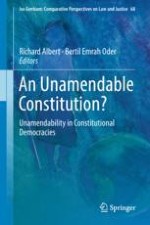This book examines the subject of constitutional unamendability from comparative, doctrinal, empirical, historical, political and theoretical perspectives. It explores and evaluates the legitimacy of unamendability in the various forms that exist in constitutional democracies.
Modern constitutionalism has given rise to a paradox: can a constitutional amendment be unconstitutional? Today it is normatively contested but descriptively undeniable that a constitutional amendment—one that respects the formal procedures of textual alteration laid down in the constitutional text—may be invalidated for violating either a written or unwritten constitutional norm. This phenomenon of an unconstitutional constitutional amendment traces its political foundations to France and the United States, its doctrinal origins to Germany, and it has migrated in some form to all corners of the democratic world. One can trace this paradox to the concept of constitutional unamendability. Constitutional unamendability can be understood as a formally entrenched provision(s) or an informally entrenched norm that prohibits an alteration or violation of that provision or norm. An unamendable constitutional provision is impervious to formal amendment, even with supermajority or even unanimous agreement from the political actors whose consent is required to alter the constitutional text. Whether or not it is enforced, and also by whom, this prohibition raises fundamental questions implicating sovereignty, legitimacy, democracy and the rule of law.
